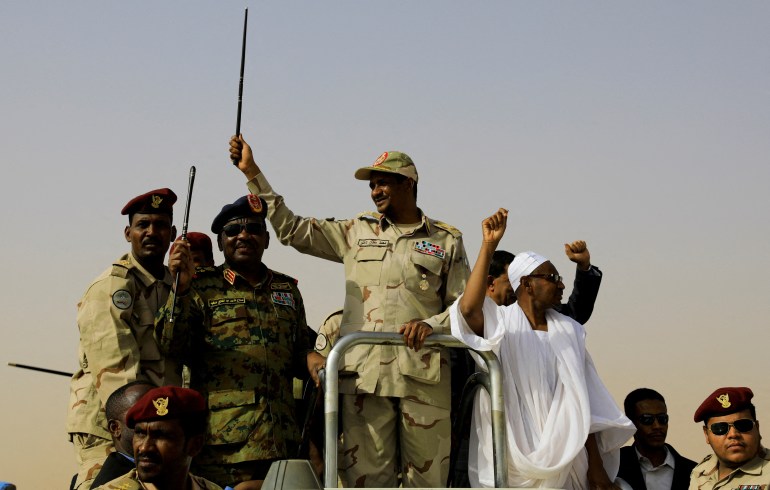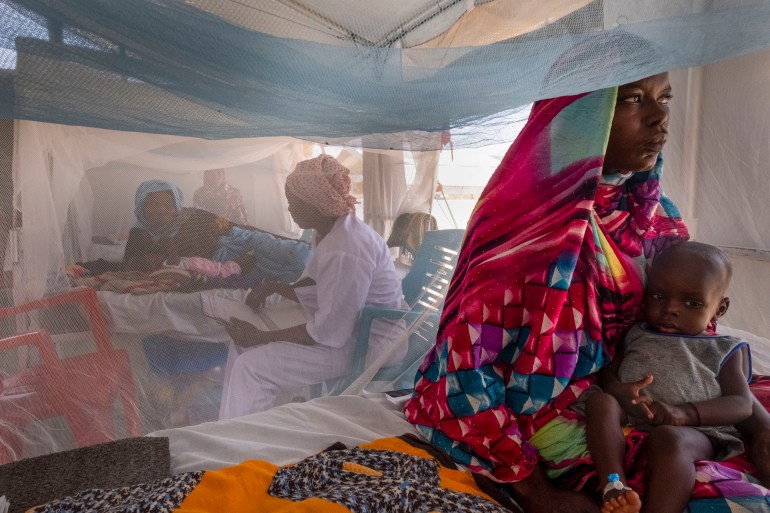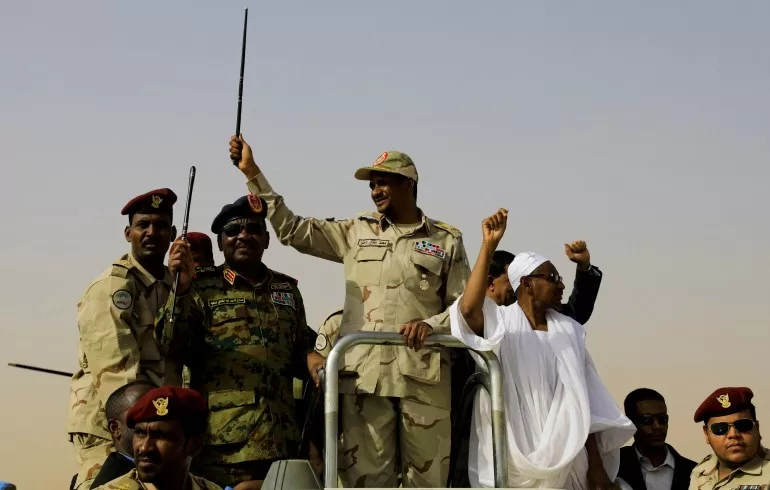Clashes between the Sudanese army and the rival RSF are pulling in tribal actors, raising fears of a spiral into mass killings along ethnic lines, said the director of an international nongovernmental organisation (INGO), who requested anonymity to protect their team in North Darfur.
For the past week, the RSF and aligned nomadic (referred to as “Arab”) militias have clashed with the Sudanese army and allied sedentary (referred to as “non-Arab”) tribal armed movements in North Darfur.
Last week, tensions soared after the Joint Force of Armed Struggle Movements – a coalition of “non-Arab” armed groups – dropped their neutrality on April 12 to support the army against the RSF.
A day later, the RSF side burned down several “non-Arab” villages in the east of North Darfur, following disputes between nomads and farming tribes over stolen cattle, according to residents.
Civilians fled the villages to al-Shagra town and Zamzam camp, which hosts hundreds of thousands of people displaced from across Darfur, and where there have been no RSF attacks to date, residents say.
“We could see an all-out war between all the tribes and that is really the doomsday scenario. At this point, it’s not unrealistic,” the head of the INGO said.
Afnan*, a psychologist in North Darfur’s capital el-Fasher, added that despite the RSF burning down villages, it seems the group is currently more focused on fighting the armed movements directly.
“The [RSF] are saying that the armed movements are the same as the army,” she told Al Jazeera.
Raising the alarm?
Last November, the RSF and allied militias defeated the army in Central, East, South and West Darfur, committing atrocities along the way. The paramilitary then surrounded el-Fasher and threatened to attack the army.
Later that month, Minni Minawi, leader of the Sudanese Liberation Movement, and Gibril Ibrahim, leader of the Justice and Equality Movement, sided with the army. Both men are from the Zaghawa non-Arab tribe.
At the time, the other “non-Arab” armed movements – the Joint Protection Forces (JPF) – reaffirmed their neutrality and deployed fighters to el-Fasher to “protect civilians”.
But with the Joint Protection Forces now at war with the RSF, there is no sizable armed actor available to mediate between the RSF and the army, said the head of the INGO mission in el-Fasher.

“I have seen the demeanour of my team change,” the source told Al Jazeera. “In October and November, the JPF was there, acting like a neutral party that brought tensions down, but now we don’t have that. So whatever spark occurs could mean an all-out war for everybody.”
A war could quickly draw in nomadic and sedentary tribes, said Afnan, adding that many youth from the Zaghawa tribe have mobilised to support the armed movements, or picked up weapons to protect themselves.
“We’re expecting a confrontation,” she said. “The armed movements and the army are in the centre of el-Fasher and in the central market. We’re expecting clashes here, especially if the RSF decides to advance on the centre of the city.”
Regional implications
The Zaghawa tribe extends beyond the borders of Sudan into Chad, and a tribal conflict in North Darfur could draw in Chadian fighters, said Remadji Hoinathy, an expert with the Institute for Security Studies think-tank focusing on Africa.
“Zaghawa people from remote villages in Chad – who live along the border and are very armed – could absolutely be implicated in the conflict [in North Darfur],” Hoinathy told Al Jazeera.
“They could choose to defend villages that could still be defended from the RSF and these dynamics should be observed closely.”
Chad is ruled by President Mahamat Idriss Deby, who took over after his father died unexpectedly in a battle against anti-government rebels in April 2021.
Since the war in Sudan erupted, Deby has been under extensive internal and external pressure to support a side, according to the International Crisis Group, a non-profit dedicated to preventing and mitigating conflict worldwide.
In January, a report by a panel of experts from the United Nations Security Council found “credible evidence” that Deby allows the United Arab Emirates to use Chadian territory to smuggle weapons to the RSF regularly.
The UAE denies the accusations.
Hoinathy said the UAE has leverage over Chad since it is a major provider of financial and military aid to Deby, a relationship that would be tested if the RSF goes to war with Zaghawa armed groups in North Darfur.
In the event of such a conflict, he predicts that high-ranking Zaghawa army officers from Chad will cross into Darfur to fight.
“If they get no support, then this will be seen as a major betrayal by Mahamat Deby and it could lead to a rebellion against him in Chad,” he said.
Bombings and arrests
While the RSF is committing grave violations in North Darfur, so is the Sudanese army, residents told Al Jazeera.
Over the last week, the army has bombed a number of RSF positions, killing scores of civilians. The aerial attacks often come at night, making it difficult for civilians to move away from targeted RSF fighters and positions.

“Every two or three days, the warplanes are hitting RSF positions … but they never hit their targets precisely. For every attack, there are always victims. Civilians are either killed or badly injured and then taken to the hospital,” Afnan told Al Jazeera.
Hoaa al-Daoud, a journalist from North Darfur, said she recently fled to South Sudan due to threats from military intelligence. She added that there has been strict monitoring of civil activists throughout el-Fasher.
“There are a lot of threats from the intelligence and the situation is very difficult. There is a lot of monitoring of journalists and the situation is quite unsafe,” she told Al Jazeera.
The RSF is also assaulting and detaining non-Arab men out of fear that they could be informers for the army, residents told Al Jazeera. Arrests by both sides often cut across tribal lines, raising fears that a battle for el-Fasher could lead to mass ethnic killings.
“The undertone of ethnicity is the problem in all of this,” said the head of mission from the INGO in el-Fasher.
“The worst case scenario is that people are [killed] based on ethnicity. And not just based on ethnicity, but based on how they look. If you look a certain way, it’s going to be the same result,” the source said.
